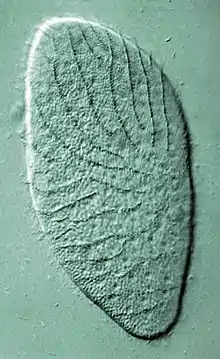Opalozoa
Opalozoa is a subphylum of heterotrophic protists of the phylum Bigyra, and is the sister group to Sagenista.[2][1] Opalozoans are non-photosynthetic heterokonts that are ancestrally phagotrophic but many times have evolved to be osmotrophic saprotrophs in the gut of vertebrate animals.[3]
| Opalozoa | |
|---|---|
 | |
| Opalina ranarum, an opalozoan | |
| Scientific classification | |
| Kingdom: | Chromista |
| Phylum: | Bigyra |
| Subphylum: | Opalozoa Cavalier-Smith, 1991 stat. nov. 2006[1] |
| Infraphyla and classes[1] | |
| |
Taxonomy
History: phylum Opalozoa
In 1993 the name “Opalozoa” referred to a group of protists that was very different from what it is now. It was a phylum composed of many unrelated zooflagellates, grouped together because of the common presence of tubular mitochondrial cristae and the lack of cortical alveoli or rigid tubular ciliary hairs (retronemes). It also included the opalinids, proteomyxids and plasmodiophorids.[4]
|
Subphylum Proterozoa |
Subphylum Opalinata |
Subphylum Kinetomonada |
Subphylum Hemimastigophora |
Modern classification
The modern taxonomy of Opalozoa, down to order level, is as follows:[1]
- Subphylum Opalozoa Cavalier-Smith, 1991 stat. nov. 2006 emend. 2018
- Infraphylum Bikosia Cavalier-Smith, 2013
- Class Bikosea Cavalier-Smith nom. n. pro Bicosoecea Cavalier-Smith, 1986
- Subclass Bicosidia Cavalier-Smith, 2006 orth. emend.
- Superorder Cyathobodoniae Cavalier-Smith, 1993 emend. stat. nov. 2006
- Order Bicoecida Grassé, 1926
- Order Anoecida Cavalier-Smith, 1997 emend. 2006
- Order Pseudodendromonadida Hibberd, 1985 emend. Cavalier-Smith, 2006
- Superorder Borokiae Cavalier-Smith, 2006
- Order Borokida Cavalier-Smith, 2006
- Superorder Cyathobodoniae Cavalier-Smith, 1993 emend. stat. nov. 2006
- Subclass Rictidia Cavalier-Smith, 2013
- Order Rictida Cavalier-Smith, 2013
- Subclass Bicosidia Cavalier-Smith, 2006 orth. emend.
- Class Bikosea Cavalier-Smith nom. n. pro Bicosoecea Cavalier-Smith, 1986
- Infraphylum Placidozoa Cavalier-Smith, 2013
- Superclass Wobblata Cavalier-Smith, 2006 stat. nov. 2013 [paraphyletic]
- Class Placididea Moriya, Nakayama & Inouye, 2002
- Order Placidida Moriya, Nakayama & Inouye, 2002 [=Placidae Cavalier-Smith, 2006]
- Class Nanomonadea Cavalier-Smith, 2013
- Order Uniciliatida Cavalier-Smith, 2013
- Class Opalomonadea Cavalier-Smith, 2013
- Class Placididea Moriya, Nakayama & Inouye, 2002
- Superclass Opalinata Wenyon, 1926 emend. Cavalier-Smith, 1996 stat. nov. 2006
- Superclass Wobblata Cavalier-Smith, 2006 stat. nov. 2013 [paraphyletic]
- Infraphylum Bikosia Cavalier-Smith, 2013
- Opalozoa incertae sedis:
- Pendulomonas Tong, 1977
- Bordnamonadidae Cavalier-Smith, 2013
Phylogeny
The cladogram below shows the internal relationships of Opalozoa.[1]
| Opalozoa |
|
"Wobblata" | ||||||||||||||||||||||||||||||||||||||||||||||||||||||
References
- Cavalier-Smith, Thomas; Scoble, Josephine Margaret (2012). "Phylogeny of Heterokonta: Incisomonas marina, a uniciliate gliding opalozoan related to Solenicola (Nanomonadea), and evidence that Actinophryida evolved from raphidophytes". European Journal of Protistology. 49: 328–353. doi:10.1016/j.ejop.2012.09.002.
- Cavalier-Smith, Thomas (2017). "Kingdom Chromista and its eight phyla: a new synthesis emphasising periplastid protein targeting, cytoskeletal and periplastid evolution, and ancient divergences". Protoplasma. 255: 297–357. doi:10.1007/s00709-017-1147-3.
- Cavalier-Smith, Thomas; Chao, Ema E-Y. (2006). "Phylogeny and Megasystematics of Phagotrophic Heterokonts (Kingdom Chromista)". J Mol Evol. 62: 388–420. doi:10.1007/s00239-004-0353-8.
- Cavalier-Smith T (September 1993). "The Protozoan Phylum Opalozoa". Eukaryotic Microbiology. 40 (5): 609–615. doi:10.1111/j.1550-7408.1993.tb06117.x.